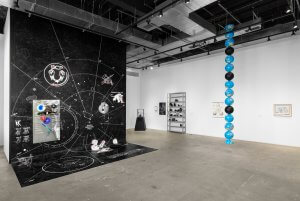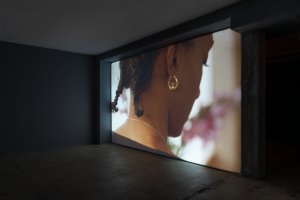Nolan Oswald Dennis: overturns & Deborah-Joyce Holman: Close-Up | Observer
Feb 28 2025


Black Identity Across Continents: An Interview With Artists Nolan Oswald Dennis and Deborah-Joyce Holman
In separate shows at New York’s Swiss Institute, the two consider representation and decolonization.
“It feels like it came out of a shared community,” the Johannesburg-based South African artist Nolan Oswald Dennis tells Observer about making his U.S. institutional debut alongside London-based Swiss artist Deborah-Joyce Holman in separate exhibitions exploring Black identity. “Deborah and I have known each other for a very long time even though we’re from different parts of the world… that community for me is this kind of African and African diaspora, Black and brown, post-colonial art world.”
In January, their solo shows—Dennis’ “overturns,” which examines decolonization and practices of Black, Queer and Indigenous liberation, and Holman’s Close-Up, which considers the politics of representation of Black and Queer people on the screen, opened at the Swiss Institute in New York. We spoke with the artists about those exhibitions and their impact.
Does it mean anything that this is your institutional show debut in the United States?
Dennis: I think, for me, it’s significant in relation to the history of Black and African presence in America. And so I think it feels meaningful to me to present my work in dialogue with the history of other African people—especially in New York.
And there’s a work in the show called Black Liberation Zodiac (Kgositsile’s Folly). Keorapetse Kgositsile was a South African poet who lived in the U.S. in the ‘70s and ‘80s, so this is, for me, the framework that I think about and the significance of sharing my work in America. Then, of course, there’s the trouble of the U.S., and I think being South African. It’s a complicated time. It’s hard to think about significance beyond solidarity, let’s say.
There’s the belief that shows like these elevate the careers of artists. Obviously the work is also introduced to a new audience—do you have expectations around that?
Dennis: I think for me it’s exciting to imagine that the work is being encountered by people who I would never have the opportunity to connect with through my work. So the show is kind of meaningful to me in this way. But I think the idea of a career in the art world, in the museum world, in this kind of structure, it’s every day less and less appealing. Because it’s every day less and less secure, especially if you’re African. And if you’re from South Africa, and if you have a sexual orientation of a certain type or a political orientation of a certain type, these spaces are not welcoming even in the way that they were maybe a year or two ago. I don’t have this excitement about entering into a kind of professional circulation through these institutions. It’s more scary to imagine what the pushback will be.
Are there some similarities in your experiences as Black people, even though you come from and live in different parts of the world?
Holman: I think maybe the relation happens through a shared, or I’m assuming, Nolan, you will correct me if I’m wrong, but maybe a shared interest in projects of liberation and what that can look like, what the strategies are, what the stakes are, what the different, contextual, conditions are. That’s also something that Nolan mentioned in the beginning in terms of it being interesting that we’re all from such different places, including KJ, and the exhibition taking place in a place that none of us are from or speaking from.
And I guess the global relation may happen through a shared experience of the opposite. Often I feel like, you know, what’s the stake or the conversation around Blackness is often had from maybe the flipping of the opposite, which is an experience of being faced with living in a white supremacist, capitalist framework, where, out of which some shared experiences of, I don’t know if I want to say subjugations or prejudice or something come out of. But then, I guess our shape still, once you go deeper, is shared; it becomes a question around ethnicity, not just race.
Dennis: I agree. Blackness and Black experiences are so diverse they really don’t collapse into a single shared definition or a single shared experience. But when you encounter each other, and this is, I’m going to speak in such vague terms, but I think it’s important to say it in this open way. There are things that are quite obviously shared. Those can be bad experiences of existing in the world, but I find more often, it’s a kind of attitude that you see in the work that people do and the way that people move.
And I guess maybe like Deborah said about liberation, it is maybe the important thing that underlies it all, the sense that we will be free. And wherever we are, there’s always this thing that’s a hit on your back, but I don’t know. It’s a very vague thing to say, but maybe the difference between coming from Africa and traveling through Europe or traveling in the U.S. is also an additional kind of experience. But even in spite of that difference, there’s a kind of mutual recognition, and there’s something that you see in each other. It’s a difficult question to answer.
